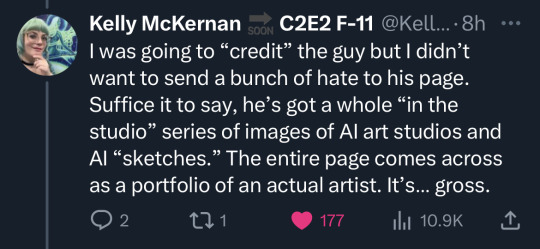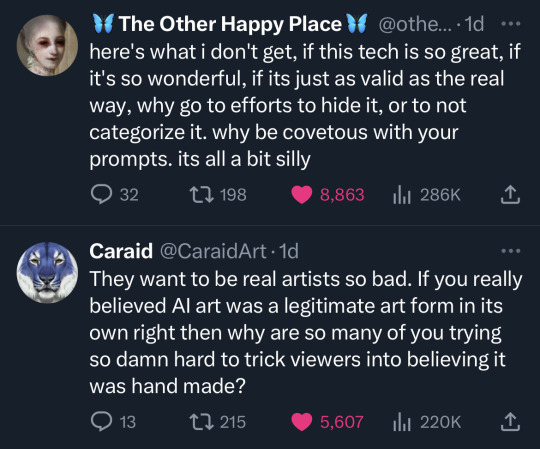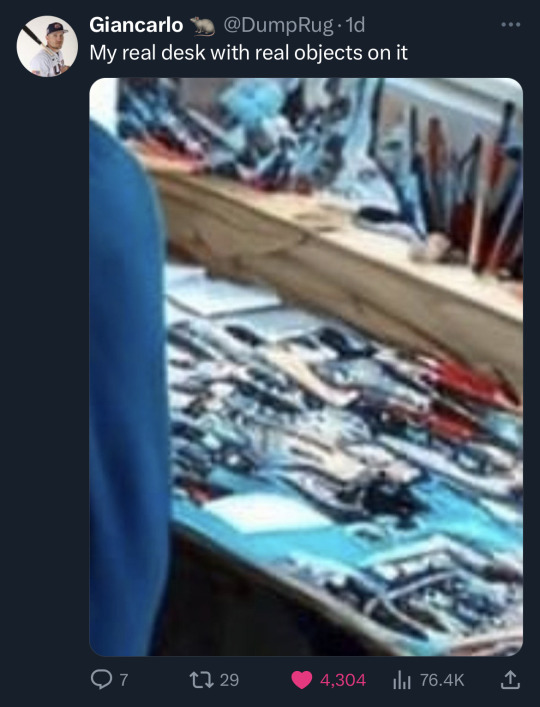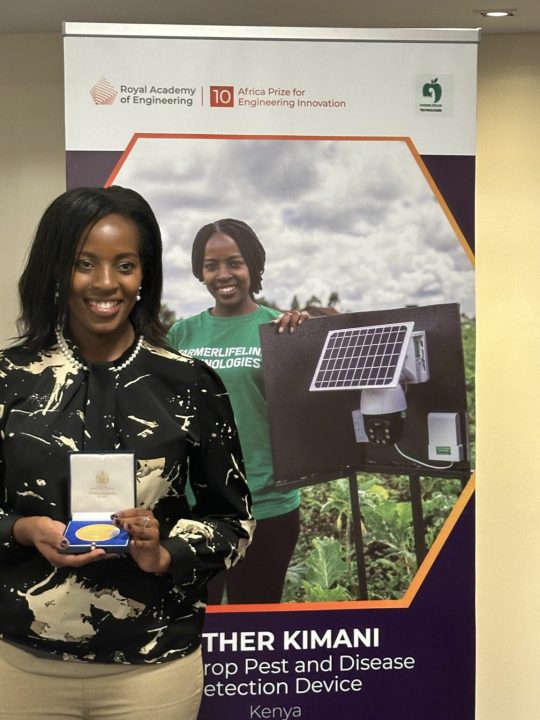#AI Innovator
Explore tagged Tumblr posts
Text
Meet Mr Sylvain Zyssman, a Tech Expert
Sylvain, from France, is the technical brain behind the Illumination Substack Mastery Boost Dear Subscribers, As an editor, content curator, and now a founding member of the Illumination Substack Mastery community I started introducing my editor and writer colleagues. It is a great pleasure for me to do so. My latest one was about David Mokotoff, MD. If you missed it, you can read from this…
#AI Innovator#Business-Technology Bridge#Cross-Industry Leader#Data Architect#Fullstack Pioneer#Growth Catalyst#Meet Sylvain Zyssman#Resilient Developer#Startup Visionary#Strategic Technologist#Tech Evolutionary#the technical brain behind the Illumination Substack Mastery Boost
0 notes
Text
For all the talk about Arcane and the (rightful) vitriol I see towards generative AI I see on my dash I’m kinda surprised that I haven’t seen any discussion of the fact that Viktor invented magical AI with the Hexcore, Hextech that learns is just another way of saying machine learning (the other name for AI, eh, it’s more nuanced than that but you get it) and Viktor’s plotline basically turns into a standard “scientist consumed by his own AI” plot after that
#arcane#arcane meta#Viktor arcane#maybe all that discussion was back in the S1 fandom days idk#but with AI such a hot topic the fact that Viktor made magical AI using Jayce’s more standard invention as a foundation#is surprisingly not a line of meta I’ve seen anywhere else#if anything Arcane is a surprisingly anti scientific text on some levels#or rather it deals with the positives and negatives of rapid innovation and societal polarization
113 notes
·
View notes
Text
Real innovation vs Silicon Valley nonsense

This is the LAST DAY to get my bestselling solarpunk utopian novel THE LOST CAUSE (2023) as a $2.99, DRM-free ebook!

If there was any area where we needed a lot of "innovation," it's in climate tech. We've already blown through numerous points-of-no-return for a habitable Earth, and the pace is accelerating.
Silicon Valley claims to be the epicenter of American innovation, but what passes for innovation in Silicon Valley is some combination of nonsense, climate-wrecking tech, and climate-wrecking nonsense tech. Forget Jeff Hammerbacher's lament about "the best minds of my generation thinking about how to make people click ads." Today's best-paid, best-trained technologists are enlisted to making boobytrapped IoT gadgets:
https://pluralistic.net/2024/05/24/record-scratch/#autoenshittification
Planet-destroying cryptocurrency scams:
https://pluralistic.net/2024/02/15/your-new-first-name/#that-dagger-tho
NFT frauds:
https://pluralistic.net/2022/02/06/crypto-copyright-%f0%9f%a4%a1%f0%9f%92%a9/
Or planet-destroying AI frauds:
https://pluralistic.net/2024/01/29/pay-no-attention/#to-the-little-man-behind-the-curtain
If that was the best "innovation" the human race had to offer, we'd be fucking doomed.
But – as Ryan Cooper writes for The American Prospect – there's a far more dynamic, consequential, useful and exciting innovation revolution underway, thanks to muscular public spending on climate tech:
https://prospect.org/environment/2024-05-30-green-energy-revolution-real-innovation/
The green energy revolution – funded by the Bipartisan Infrastructure Act, the Inflation Reduction Act, the CHIPS Act and the Science Act – is accomplishing amazing feats, which are barely registering amid the clamor of AI nonsense and other hype. I did an interview a while ago about my climate novel The Lost Cause and the interviewer wanted to know what role AI would play in resolving the climate emergency. I was momentarily speechless, then I said, "Well, I guess maybe all the energy used to train and operate models could make it much worse? What role do you think it could play?" The interviewer had no answer.
Here's brief tour of the revolution:
2023 saw 32GW of new solar energy come online in the USA (up 50% from 2022);
Wind increased from 118GW to 141GW;
Grid-scale batteries doubled in 2023 and will double again in 2024;
EV sales increased from 20,000 to 90,000/month.
https://www.whitehouse.gov/briefing-room/blog/2023/12/19/building-a-thriving-clean-energy-economy-in-2023-and-beyond/
The cost of clean energy is plummeting, and that's triggering other areas of innovation, like using "hot rocks" to replace fossil fuel heat (25% of overall US energy consumption):
https://rondo.com/products
Increasing our access to cheap, clean energy will require a lot of materials, and material production is very carbon intensive. Luckily, the existing supply of cheap, clean energy is fueling "green steel" production experiments:
https://www.wdam.com/2024/03/25/americas-1st-green-steel-plant-coming-perry-county-1b-federal-investment/
Cheap, clean energy also makes it possible to recover valuable minerals from aluminum production tailings, a process that doubles as site-remediation:
https://interestingengineering.com/innovation/toxic-red-mud-co2-free-iron
And while all this electrification is going to require grid upgrades, there's lots we can do with our existing grid, like power-line automation that increases capacity by 40%:
https://www.npr.org/2023/08/13/1187620367/power-grid-enhancing-technologies-climate-change
It's also going to require a lot of storage, which is why it's so exciting that we're figuring out how to turn decommissioned mines into giant batteries. During the day, excess renewable energy is channeled into raising rock-laden platforms to the top of the mine-shafts, and at night, these unspool, releasing energy that's fed into the high-availability power-lines that are already present at every mine-site:
https://www.euronews.com/green/2024/02/06/this-disused-mine-in-finland-is-being-turned-into-a-gravity-battery-to-store-renewable-ene
Why are we paying so much attention to Silicon Valley pump-and-dumps and ignoring all this incredible, potentially planet-saving, real innovation? Cooper cites a plausible explanation from the Apperceptive newsletter:
https://buttondown.email/apperceptive/archive/destructive-investing-and-the-siren-song-of/
Silicon Valley is the land of low-capital, low-labor growth. Software development requires fewer people than infrastructure and hard goods manufacturing, both to get started and to run as an ongoing operation. Silicon Valley is the place where you get rich without creating jobs. It's run by investors who hate the idea of paying people. That's why AI is so exciting for Silicon Valley types: it lets them fantasize about making humans obsolete. A company without employees is a company without labor issues, without messy co-determination fights, without any moral consideration for others. It's the natural progression for an industry that started by misclassifying the workers in its buildings as "contractors," and then graduated to pretending that millions of workers were actually "independent small businesses."
It's also the natural next step for an industry that hates workers so much that it will pretend that their work is being done by robots, and then outsource the labor itself to distant Indian call-centers (no wonder Indian techies joke that "AI" stands for "absent Indians"):
https://pluralistic.net/2024/05/17/fake-it-until-you-dont-make-it/#twenty-one-seconds
Contrast this with climate tech: this is a profoundly physical kind of technology. It is labor intensive. It is skilled. The workers who perform it have power, both because they are so far from their employers' direct oversight and because these fed-funded sectors are more likely to be unionized than Silicon Valley shops. Moreover, climate tech is capital intensive. All of those workers are out there moving stuff around: solar panels, wires, batteries.
Climate tech is infrastructural. As Deb Chachra writes in her must-read 2023 book How Infrastructure Works, infrastructure is a gift we give to our descendants. Infrastructure projects rarely pay for themselves during the lives of the people who decide to build them:
https://pluralistic.net/2023/10/17/care-work/#charismatic-megaprojects
Climate tech also produces gigantic, diffused, uncapturable benefits. The "social cost of carbon" is a measure that seeks to capture how much we all pay as polluters despoil our shared world. It includes the direct health impacts of burning fossil fuels, and the indirect costs of wildfires and extreme weather events. The "social savings" of climate tech are massive:
https://arstechnica.com/science/2024/05/climate-and-health-benefits-of-wind-and-solar-dwarf-all-subsidies/
For every MWh of renewable power produced, we save $100 in social carbon costs. That's $100 worth of people not sickening and dying from pollution, $100 worth of homes and habitats not burning down or disappearing under floodwaters. All told, US renewables have delivered $250,000,000,000 (one quarter of one trillion dollars) in social carbon savings over the past four years:
https://arstechnica.com/science/2024/05/climate-and-health-benefits-of-wind-and-solar-dwarf-all-subsidies/
In other words, climate tech is unselfish tech. It's a gift to the future and to the broad public. It shares its spoils with workers. It requires public action. By contrast, Silicon Valley is greedy tech that is relentlessly focused on the shortest-term returns that can be extracted with the least share going to labor. It also requires massive public investment, but it also totally committed to giving as little back to the public as is possible.
No wonder America's richest and most powerful people are lining up to endorse and fund Trump:
https://prospect.org/blogs-and-newsletters/tap/2024-05-30-democracy-deshmocracy-mega-financiers-flocking-to-trump/
Silicon Valley epitomizes Stafford Beer's motto that "the purpose of a system is what it does." If Silicon Valley produces nothing but planet-wrecking nonsense, grifty scams, and planet-wrecking, nonsensical scams, then these are all features of the tech sector, not bugs.
As Anil Dash writes:
Driving change requires us to make the machine want something else. If the purpose of a system is what it does, and we don’t like what it does, then we have to change the system.
https://www.anildash.com/2024/05/29/systems-the-purpose-of-a-system/
To give climate tech the attention, excitement, and political will it deserves, we need to recalibrate our understanding of the world. We need to have object permanence. We need to remember just how few people were actually using cryptocurrency during the bubble and apply that understanding to AI hype. Only 2% of Britons surveyed in a recent study use AI tools:
https://www.bbc.com/news/articles/c511x4g7x7jo
If we want our tech companies to do good, we have to understand that their ground state is to create planet-wrecking nonsense, grifty scams, and planet-wrecking, nonsensical scams. We need to make these companies small enough to fail, small enough to jail, and small enough to care:
https://pluralistic.net/2024/04/04/teach-me-how-to-shruggie/#kagi
We need to hold companies responsible, and we need to change the microeconomics of the board room, to make it easier for tech workers who want to do good to shout down the scammers, nonsense-peddlers and grifters:
https://pluralistic.net/2023/07/28/microincentives-and-enshittification/
Yesterday, a federal judge ruled that the FTC could hold Amazon executives personally liable for the decision to trick people into signing up for Prime, and for making the unsubscribe-from-Prime process into a Kafka-as-a-service nightmare:
https://arstechnica.com/tech-policy/2024/05/amazon-execs-may-be-personally-liable-for-tricking-users-into-prime-sign-ups/
Imagine how powerful a precedent this could set. The Amazon employees who vociferously objected to their bosses' decision to make Prime as confusing as possible could have raised the objection that doing this could end up personally costing those bosses millions of dollars in fines:
https://pluralistic.net/2023/09/03/big-tech-cant-stop-telling-on-itself/
We need to make climate tech, not Big Tech, the center of our scrutiny and will. The climate emergency is so terrifying as to be nearly unponderable. Science fiction writers are increasingly being called upon to try to frame this incomprehensible risk in human terms. SF writer (and biologist) Peter Watts's conversation with evolutionary biologist Dan Brooks is an eye-opener:
https://thereader.mitpress.mit.edu/the-collapse-is-coming-will-humanity-adapt/
They draw a distinction between "sustainability" meaning "what kind of technological fixes can we come up with that will allow us to continue to do business as usual without paying a penalty for it?" and sustainability meaning, "what changes in behavior will allow us to save ourselves with the technology that is possible?"
Writing about the Watts/Brooks dialog for Naked Capitalism, Yves Smith invokes William Gibson's The Peripheral:
With everything stumbling deeper into a ditch of shit, history itself become a slaughterhouse, science had started popping. Not all at once, no one big heroic thing, but there were cleaner, cheaper energy sources, more effective ways to get carbon out of the air, new drugs that did what antibiotics had done before…. Ways to print food that required much less in the way of actual food to begin with. So everything, however deeply fucked in general, was lit increasingly by the new, by things that made people blink and sit up, but then the rest of it would just go on, deeper into the ditch. A progress accompanied by constant violence, he said, by sufferings unimaginable.
https://www.nakedcapitalism.com/2024/05/preparing-for-collapse-why-the-focus-on-climate-energy-sustainability-is-destructive.html
Gibson doesn't think this is likely, mind, and even if it's attainable, it will come amidst "unimaginable suffering."
But the universe of possible technologies is quite large. As Chachra points out in How Infrastructure Works, we could give every person on Earth a Canadian's energy budget (like an American's, but colder), by capturing a mere 0.4% of the solar radiation that reaches the Earth's surface every day. Doing this will require heroic amounts of material and labor, especially if we're going to do it without destroying the planet through material extraction and manufacturing.
These are the questions that we should be concerning ourselves with: what behavioral changes will allow us to realize cheap, abundant, green energy? What "innovations" will our society need to focus on the things we need, rather than the scams and nonsense that creates Silicon Valley fortunes?
How can we use planning, and solidarity, and codetermination to usher in the kind of tech that makes it possible for us to get through the climate bottleneck with as little death and destruction as possible? How can we use enforcement, discernment, and labor rights to thwart the enshittificatory impulses of Silicon Valley's biggest assholes?

If you'd like an essay-formatted version of this post to read or share, here's a link to it on pluralistic.net, my surveillance-free, ad-free, tracker-free blog:
https://pluralistic.net/2024/05/30/posiwid/#social-cost-of-carbon
#pluralistic#ai#hype#anil dash#stafford beer#amazon#prime#scams#dark patterns#POSIWID#the purpose of a system is what it does#climate#economics#innovation#renewables#social cost of carbon#green energy#solar#wind#ryan cooper#peter watts#the jackpot#ai hype#chips act#ira#inflation reduction act#infrastructure#deb chachra
157 notes
·
View notes
Text
An hour and 17 minutes into Defunctland's new video. It's crazy to think that the first person to basically say "we should replace artists with robots/AI!" was... Walt Disney himself.


[around 1:17:14 in the video]
Defunctland's new video, you should watch it.
#feel like walt never really had a passion for art#maybe he did at first#but it's pretty well known that he lost this passion over time#the man's true passions were innovation. The furthering of mankind. The future#he saw animation as an evolution in human progression. Not in the way most artists or animators saw it then or now#and when that passion died off he moved onto the next innovation#food for thought#disney#walt disney#tw walt disney#I see why most artists/animators hate Walt now#YOU WERE SUPPOSED TO BE ON OUR SIDE!!!!!!#AI#anti ai art#defunctland
59 notes
·
View notes
Text
The history of computing is one of innovation followed by scale up which is then broken by a model that “scales out”—when a bigger and faster approach is replaced by a smaller and more numerous approaches. Mainframe->Mini->Micro->Mobile, Big iron->Distributed computing->Internet, Cray->HPC->Intel/CISC->ARM/RISC, OS/360->VMS->Unix->Windows NT->Linux, and on and on. You can see this at these macro levels, or you can see it at the micro level when it comes to subsystems from networking to storage to memory. The past 5 years of AI have been bigger models, more data, more compute, and so on. Why? Because I would argue the innovation was driven by the cloud hyperscale companies and they were destined to take the approach of doing more of what they already did. They viewed data for training and huge models as their way of winning and their unique architectural approach. The fact that other startups took a similar approach is just Silicon Valley at work—the people move and optimize for different things at a micro scale without considering the larger picture. See the sociological and epidemiological term small area variation. They look to do what they couldn’t do at their previous efforts or what the previous efforts might have been overlooking.
- DeepSeek Has Been Inevitable and Here's Why (History Tells Us) by Steven Sinofsky
40 notes
·
View notes
Text
















【Part 3】 ◠‿◠ Women shopping ... terrible XD hahaha
「廣西桂林好聚落」: "若生靜巷 coffee shop" & "一顆橄欖"專賣店
若生靜巷咖啡 (@umarekawatta.coffee)地址:高雄市前鎮區桂林街58巷18號 時間:10:00~18:00、週一、週四公休 電話:(07)334-5685
一顆橄欖 UNE OLIVE EN PROVENCE (一顆橄欖好生活Uneolivetw) 地址:高雄市前鎮區桂林街58巷10號 時間:週二至週日9:00~17:00 電話:(07)331-6800
#chu lan#fine craft artist#朱蘭皮藝#leather art artist#beautiful life#to see ai innovation technology exhibition#kaohsiung#taiwan#高雄展覽館#2024 meet greater south 亞灣新創大南方展#創新科技xtree創新x亞灣5g alot#經濟部產業技術司#解密科技寶藏#my life my way#tea time with vivian#一顆橄欖好生活une olive en provence /taiwan
85 notes
·
View notes
Text
omg this is so disturbing
so many startups AI companies in LA, are they hit badly?
#LA Fires#Wild fires#California Fires#Los Angeles#AI Fires#AI Los Angeles#AI Startups#Tech Startups#Silicon Beach#Tech LA#Disaster Relief#Business Continuity#Emergency Response#Tech Industry#Innovation#Cloud Computing#Remote Work#California Wildfires
33 notes
·
View notes
Text
>be google
>searches become unusable bc there's so much SEO junk on the internet, u literally have to filter searches to pre-2023 to avoid it
>frequently the only way to get an answer to particularly niche questions is to add "reddit" to the end of a search
>oh shit we should fix this
>ai that just regurgitates the SEO nonsense AND throws in some reddit for good measure
>fixed it!
131 notes
·
View notes
Text

http://aabon35.blogspot.com
#Istanbul#Turkey#http://aabon35.blogspot.com ⚫️#http://arubio28814.blogspot.com#gpt#x#ai#bard#new#ia#advanced#innovative#son#pleasant#extraordinary#patient#joyful#singular#señero#exclusivo#irrepetible#excellent#like
45 notes
·
View notes
Text

The Magic of A.I.
And more technology.
54 notes
·
View notes
Text




any sliver of a chance i had of appreciating AI has been completely decimated by this clownery
#im so sick of ai bros#you’re not an artist! you’re not fucking creative or innovative for typing words into a machine!#fuck#i mean there is something to be said about the people who developed the technology without intending for its uses becoming this catastrophic#toward artists. like there is some amount of work and creativity that goes into designing that code#but the people who just use it or understand the bare bones of the program and learn to modify it by plugging in more stolen art to train it#?? go fuck urself lol#tweets#ai art
513 notes
·
View notes
Text
WHAT PLUTO ENTERING AQUARIUS MEANS FOR US
#astrology#transit#aquarius age#age of aquarius#pluto#pluto in aquarius#zodiac#tarot#sayhoneysiren#witchcraft#patreon#art#artists on tumblr#dark academia#ai#technology#futurism#innovation#computing#technologies#atlantis#ancient history#genius#spirit#spirutality#business#online coaching#community#blog#writer
22 notes
·
View notes
Text
I am well on my way to having read Every Single Prey Fanwork posted to Ao3
#Y'all are sleeping on this franchise I stg#Listen to me#Underneath the scary fps alien shooter survival is an incredible story#About identity and what it means to be human and the dangers of science --#And that last one is specifically the dangers of innovation at the hands of sacrificial egosists masquerading as altruists#As opposed to a blanket criticism of scientific progress as a whole. Which is so fucking refreshing in the sphere of scientific villainy#And CONSENT -- they put it right there in B&W that Morgan should have been able to withdraw consent at any time and it was violated#And ofc generative AI and the question of - if you did not put in the work to learn the skill itself what value does it have#It asks whether the neuromods are a boon or a tool or a curse -- easily a stand-in for genAI. Years before genAI became widely accessible#Y'all it's such a good franchise#Arkane deserves more recognition for it imo#prey 2017
14 notes
·
View notes
Text

Transform Your #BusinessCommunication with AI-Powered Solutions.
Our AI-driven #communication services help you stay connected, efficient, and ahead of the curve. Experience the future of business communication today: https://vitelglobal.com
#BusinessInnovation#AI#CustomerService#Communication#BusinessTechnology#Innovation#ProductivityTools
7 notes
·
View notes
Text

Esther Kimani, a computer programmer from Kenya, has won the UK’s Royal Academy of Engineering’s Africa Prize for Engineering Innovation. Her groundbreaking early crop pest and disease detection device wowed the judges, thanks to its remarkable ability to swiftly detect and identify agricultural pests and diseases. This innovative tool can reduce crop losses for smallholder farmers by up to 30% and boost yields by as much as 40%.
Harnessing the power of solar energy, the device employs computer vision algorithms and advanced machine learning to detect and identify crop pests, pathogens, or diseases, and the nature of the infection or infestation. Farmers receive notifications via SMS, making this an affordable alternative to traditional detection methods at just $3 per month—significantly cheaper than hiring drones or agricultural inspectors.
source
#solarpunk#solar punk#africa#ai#solarpower#agriculture#mobile tech#pest#solar power#solarpunk innovation#kenya#women#woman
17 notes
·
View notes